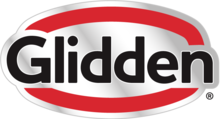Glidden (paints)
 | |
| Company type | Subsidiary |
|---|---|
| Industry | Paint |
| Founded | Cleveland, Ohio, U.S. (1875) |
| Founder | Francis Harrington Glidden, Levi Brackett and Thomas Bolles |
| Headquarters | , U.S. |
Area served | North America |
| Products | Paint, Home improvement products |
| Revenue | $1.5 billion (2011) |
| Parent | PPG Industries |
| Website | glidden.com |
Glidden is an American paint brand, manufactured by PPG Industries.
Glidden was purchased by British conglomerate ICI in 1986, which in turn was later acquired by Dutch conglomerate AkzoNobel in 2008. PPG Industries announced an agreement to acquire Glidden from AkzoNobel for $1.05 billion on December 14, 2012. The transaction closed April 1, 2013.[1] Following the deal, PPG will be the second largest paint manufacturer in North America, behind Sherwin-Williams.[2]
History
[edit]Glidden was started in Cleveland, Ohio, in 1875 by Francis Harrington Glidden, Levi Brackett and Thomas Bolles.[3] It began making varnishes for furniture, pianos, carriages, and wagons.[4] It expanded greatly, opening a 17-acre varnish factory in 1908 which was claimed to be the largest in the world.[5]
It was initially named the Glidden, Brackett & Company and was renamed later to the Glidden & Joy Company,[3] and in 1890 incorporated as The Glidden Varnish Company.[3] Francis Glidden retired from the business at the age of 85, turning the company over to Adrian D. Joyce and his associates after a public sale. Joyce became president when Glidden was incorporated in 1917, a title he would retain until 1950, when his son, Dwight P. Joyce, succeeded him. Joyce rolled up ten paint and varnish competitors in his first two years at the helm.
During the Roaring Twenties, Joyce greatly expanded the company by integrating vertically through the acquisition of chemical and pigment companies, and creating The Glidden Food Products Co. in 1920.[4]
Glidden famously employed the chemist Percy Julian in the 1930s, who was one of the first African-Americans to receive a Ph.D. in chemistry.
In 1967, Glidden merged with SCM Corporation and became the Glidden-Durkee Division of that company. In less than 10 years, the division became responsible for two thirds of SCM's sales. SCM was acquired by Hanson Trust, PLC, in 1986; Hanson sold the Glidden Division (retaining Durkee foods) to Imperial Chemical Industries. ICI was bought by the Dutch company AkzoNobel in 2008; Akzo Nobel's American decorative paints business was bought by Pittsburgh's PPG in 2013.[6]

References
[edit]- ^ Noel, Andrew (November 14, 2012). "PPG to acquire piece of AkzoNobel in $1.05 billion transaction". Bloomberg News. Retrieved 2021-01-19.
- ^ Pledger, Marcia (December 14, 2012). "Akzo Nobel sells Glidden and rest of U.S. house paints division including Strongsville headquarters". The Plain Dealer. Cleveland. Archived from the original on 2018-10-24. Retrieved 2021-01-29.
- ^ a b c Orth, Samuel Peter; Clarke, S.J. (1910). A History of Cleveland, Ohio: Biographical. Chicago-Cleveland: S.J. Clarke Publishing. p. 660. OCLC 732890.
- ^ a b The Glidden Company History Archived 2012-10-17 at the Wayback Machine. Retrieved December 14, 2012.
- ^ Kinney, Thomas A. (2004). The Carriage Trade. JHU Press. p. 126. ISBN 978-0801879463. Archived from the original on 2023-09-29. Retrieved 2020-09-23.
- ^ "Glidden Coatings and Resin Division ICI". Encyclopedia of Cleveland History. Case Western Reserve University. 11 May 2018. Archived from the original on 2020-10-29. Retrieved 2021-01-29.
External links
[edit]- Glidden website Archived 2014-08-26 at the Wayback Machine
- Jap-A-Lac, Glidden Varnish Company, 1890 Archived 2016-12-02 at the Wayback Machine Kenneth Franzheim II Rare Books Room, William R. Jenkins Architecture and Art Library, University of Houston Digital Library.
- Shurtleff, William; Aoyagi, Akiko (2020). History of the Glidden Co. and of the Work of Adrian D. Joyce and Percy L. Julian with Soybeans and Soyfoods(1917-2020): Extensively Anotated Bibliography and Sourcebook (PDF). Lafayette, CA: Soyinfo Center. ISBN 9781948436250. Archived (PDF) from the original on 2021-06-13. Retrieved 2021-11-23.

